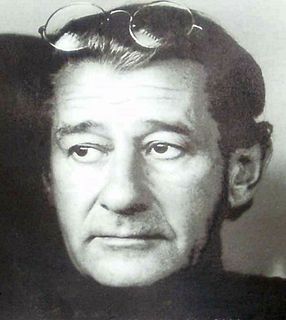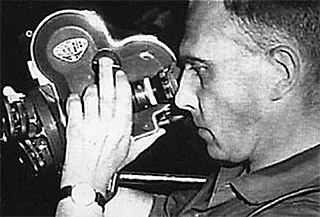A Quote by Laurence Sterne
There is no small degree of malicious craft in fixing upon a season to give a mark of enmity and ill-will: a word--a look, which at one time would make no impression, at another time wounds the heart, and, like a shaft flying with the wind, pierces deep, which, with its own natural force, would scarce have reached the object aimed at.
Related Quotes
My reluctance to use alien invasion is due to the feeling that we are not likely to be invaded and taken over. It would seem to me that by the time a race has achieved deep space capability it would have matured to a point where it would have no thought of dominating another intelligent species. Further than this, there should be no economic necessity of its doing so. By the time it was able to go into deep space, it must have arrived at an energy source which would not be based on planetary natural resources.
With TV season structures - and I'm a huge TV watcher - you look at shows like 'Breaking Bad,' which is my favorite show of all time, and 'The Sopranos,' which is pretty high up there as well, and there was that thing where, every season, Walter White would go up a level, but there would be a new bad.
To the distracting occupations belong especially my lecture courses which I am holding this winter for the first time, and which now cost much more of my time than I like. Meanwhile I hope that the second time this expenditure of time will be much less, otherwise I would never be able to reconcile myself to it, even practical (astronomical) work must give far more satisfaction than if one brings up to B a couple more mediocre heads which otherwise would have stopped at A.
I am not a mechanism, an assembly of various sections. and it is not because the mechanism is working wrongly, that I am ill. I am ill because of wounds to the soul, to the deep emotional self, and the wounds to the soul take a long, long time, only time can help and patience, and a certain difficult repentance long difficult repentance, realization of life’s mistake, and the freeing oneself from the endless repetition of the mistake which mankind at large has chosen to sanctify.
Philosophy would long ago have reached a high level if our predecessors and fathers had put this into practice; and we would not waste time on the primary difficulties, which appear now as severe as in the first centuries which noticed them. We would have the experience of assured phenomena, which would serve as principles for a solid reasoning; truth would not be so deeply sunken; nature would have taken off most of her envelopes; one would see the marvels she contains in all her individuals.
If we could travel into the past, it's mind-boggling what would be possible. For one thing, history would become an experimental science, which it certainly isn't today. The possible insights into our own past and nature and origins would be dazzling. For another, we would be facing the deep paradoxes of interfering with the scheme of causality that has led to our own time and ourselves. I have no idea whether it's possible, but it's certainly worth exploring.
Among all the valuable things of this world, the word is the most precious. For in the word one can find a light which gems and jewels do not possess; a word may contain so much life that it can heal the wounds of the heart. Therefore, poetry in which the soul is expressed is as living as a human being. The greatest reward that God bestows on man is eloquence and poetry. This is not an exaggeration, for it is the gift of the poet that culminates, in time, with the gift of prophecy.
From that day on, it was the desert that would be important. She would look to it everyday, and would try to guess which star the boy was following in search of his treasure. She would have to send her kisses on the wind hoping that the wind would touch the boy's face, and would tell him that she was alive.
There is another temptation which we must especially guard against: the simplistic reductionism which sees only good or evil; or, if you will, the righteous and sinners. The contemporary world, with its open wounds which affect so many of our brothers and sisters, demands that we confront every form of polarization which would divide it into these two camps.
We greatly want a brief word to express the science of improving stock, which is by no means confined to questions of judicious mating, but which, especially in the case of man, takes cognizance of all influences that tend in however remote a degree to give to the more suitable races or strains of blood a better chance of prevailing speedily over the less suitable than they otherwise would have had. The word eugenics would sufficiently express the idea.
Now, I testify it is a small voice. It whispers, not shouts. And so you must be very quiet inside. That is why you may wisely fast when you want to listen. And that is why you will listen best when you feel, "Father, thy will, not mine, be done." You will have a feeling of "I want what you want." Then, the still small voice will seem as if it pierces you. It may make your bones to quake. More often it will make your heart burn within you, again softly, but with a burning which will lift and reassure.
Who said that time heals all wounds? It would be better to say that time heals everything - except wounds. With time, the hurt of separation loses its real limits. With time, the desired body will soon disappear, and if the desiring body has already ceased to exist for the other, then what remains is a wound, disembodied.
Winter is the time for comfort, for good food and warmth, for the touch of a friendly hand and for a talk beside the fire: it is the time for home. It is no season in which to wander the world as if one were the wind blowing aimlessly along the streets without a place to rest, without food, and without time meaning anything to one, just as time means nothing to the wind.
If men lived like men indeed, their houses would be temples -- temples which we should hardly dare to injure, and in which it would make us holy to be permitted to live; and there must be a strange dissolution of natural affection, a strange unthankfulness for all that homes have given and parents taught, a strange consciousness that we have been unfaithful to our fathers honor, or that our own lives are not such as would make our dwellings sacred to our children, when each man would fain build to himself, and build for the little revolution of his own life only.






































